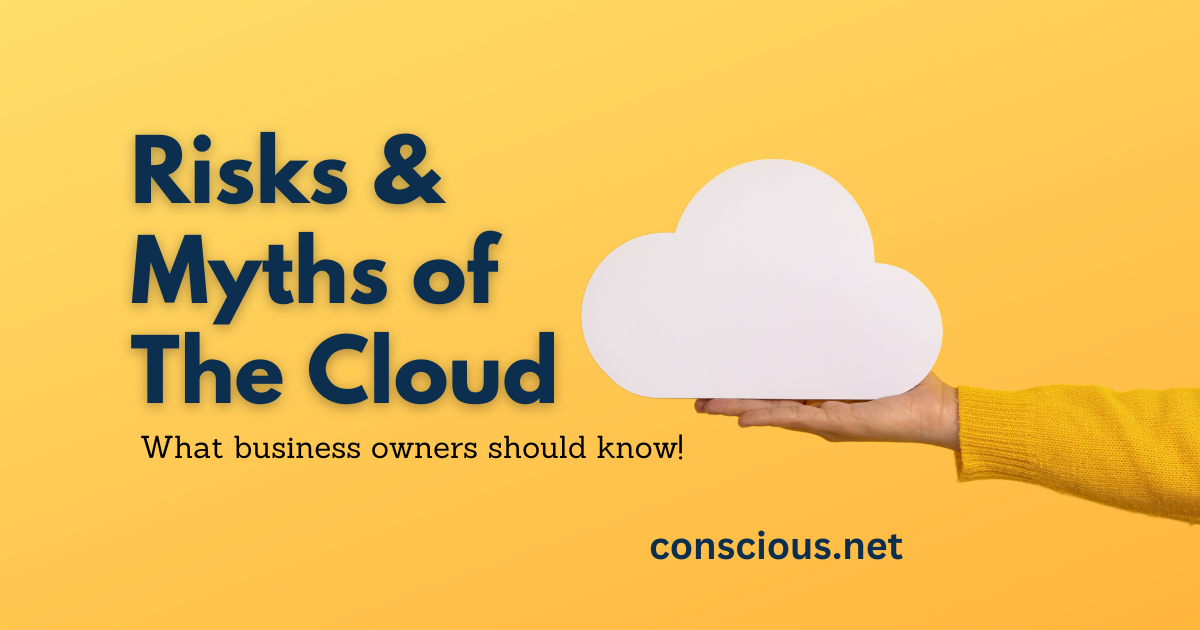Risks & Myths About Cloud Data for Business

Cloud data storage offers numerous benefits for businesses, such as cost-effectiveness, scalability, and accessibility. However, it also comes with certain risks that businesses should be aware of and take appropriate measures to mitigate. In addition, there are some common myths about cloud data. Let’s review the risks and myths about cloud data for business.
Options for Cloud Data for Business
There are many ways to utilize the cloud for your business and you would be hard-pressed to find a business or employee(s) that aren’t utilizing some type of cloud platform. There are public and private cloud options. The cloud option that’s right for you depends on several factors. The first consideration is the type of cloud service you require because this can often determine your choice. There are three broad categories:
- Software-as-a-service (SaaS) – Can be hosted in a private cloud but often occur in public clouds
- Infrastructure-as-a-service (IaaS) – Can be hosted in a private cloud but usually happen in public clouds
- Platform-as-a-service (PaaS) – Almost always on a private cloud behind a firewall
There are also additional considerations for cloud data management services such as scaling, backup and recovery, tech support, and single source of truth management. A reliable technology partner can advise you on the types of cloud environments that will provide the most benefits while minimizing risks.
Risks of Cloud for Business
- Data Breaches: One of the most significant concerns with cloud data storage is the risk of data breaches. If the cloud service provider’s security measures are inadequate or if user authentication credentials are compromised, unauthorized individuals could gain access to sensitive business data.
- Data Loss: While cloud providers typically have robust data backup and disaster recovery systems, there is still a risk of data loss due to hardware failures, natural disasters, or even mistakes made by cloud service providers.
- Lack of Control: By using a third-party cloud service, a small business relinquishes some control over their data. Depending on the terms of service, the cloud provider may have the right to access or use the data, raising privacy concerns. A technology adviser, like Conscious Networks, can help you review the EULA or service agreements to ensure that Big Data Doesn’t Own Your data.
- Compliance and Legal Issues: Storing data in the cloud may pose challenges in meeting specific regulatory compliance requirements, such as GDPR, HIPAA, or industry-specific regulations. Failing to comply with these regulations can result in legal penalties.
- Downtime and Availability: Cloud service providers can experience downtime due to maintenance, technical issues, or cyberattacks. This downtime may disrupt business operations and access to critical data.
- Data Interception: While data is transmitted to and from the cloud, there is a risk of interception by malicious actors if proper encryption measures are not in place.
Common Myths About Cloud Data for Business
When considering the risks above, it’s also important to separate fact from fiction. Here are some common myths about cloud data for business. An independent technology adviser can help you review your cloud service provider and their protocols and policies to protect your business and help you make the best decisions about technology.
- Myth #1: Cloud Data Is Not Secure – One of the most persistent myths is that cloud data is inherently less secure than traditional on-premises data storage. In reality, reputable cloud service providers invest heavily in security measures, such as data encryption, access controls, and multi-factor authentication. Many businesses find that cloud providers have stronger security protocols than they could implement on their own. It’s important to review your cloud service providers ULA or service agreements to understand their commitments or where they may fall short.
- Myth #2: Cloud Data Is More Prone to Data Loss – Some businesses worry that moving data to the cloud puts them at a higher risk of data loss. In truth, cloud providers typically have robust data backup and disaster recovery systems. They often maintain multiple copies of data across geographically diverse data centers, reducing the risk of data loss due to hardware failures or natural disasters. However, we have seen major cloud providers, it’s important to have your own independent backup and recovery strategy or a hybrid approach to ensure the best protection.
- Myth #3: Cloud Data Is Not Compliant – Some businesses fear that moving data to the cloud will make it difficult to comply with industry-specific regulations like GDPR, HIPAA, or SOX. However, reputable cloud service providers often offer compliance certifications and adhere to strict security standards. Compliance is a shared responsibility, and businesses must search out and choose a provider that meets their specific regulatory requirements. This is where an IT adviser can be especially helpful.
- Myth #4: Cloud Data Is Always Connected – There is a misconception that cloud data is only accessible when connected to the internet. While real-time access may be limited without an internet connection, many cloud storage solutions offer offline access, allowing users to work on files locally and sync changes when they reconnect.
- Myth #5: Cloud Data Is Only for Large Businesses – It’s a common misconception that cloud data storage is suitable only for large enterprises. In reality, cloud solutions are scalable and adaptable, making them equally advantageous for small and medium-sized businesses.
Understanding the risks and dispelling the myths is crucial for businesses to make informed decisions about adopting cloud data solutions. While cloud computing is not without its challenges, it offers numerous benefits, including cost-efficiency, scalability, and enhanced data security when chosen and implemented wisely. A technology advisor, like Conscious Networks, can be invaluable in helping you evaluate your cloud options. Schedule a consultation to review your business initiatives and recommendations to enhance your technology while minimizing risks.



